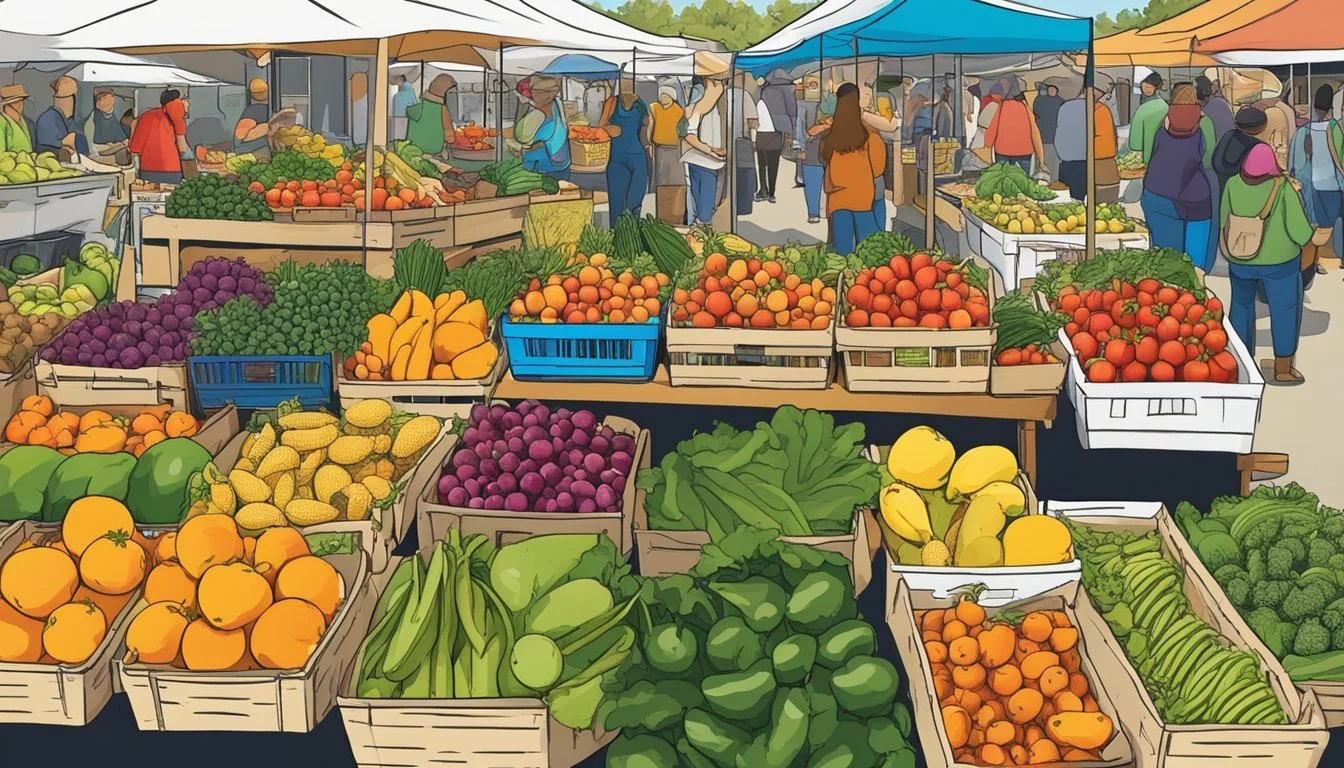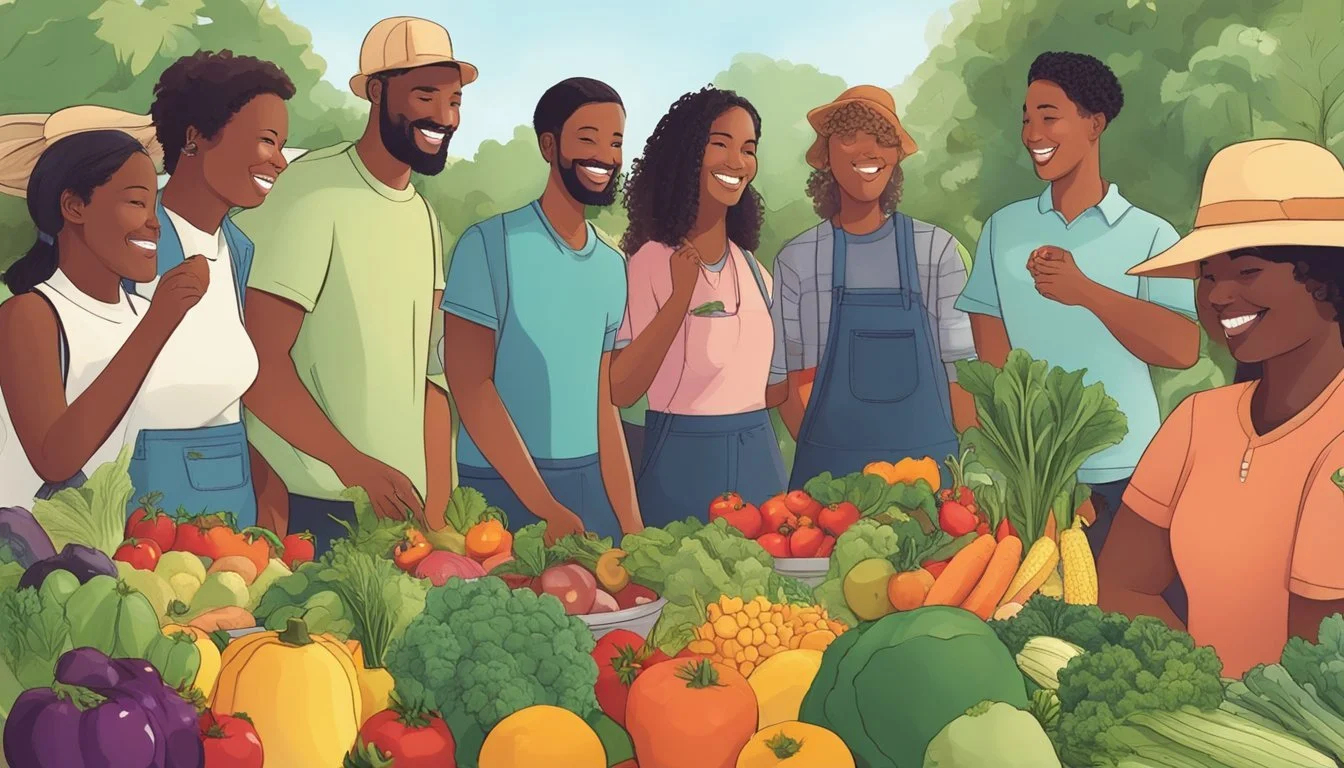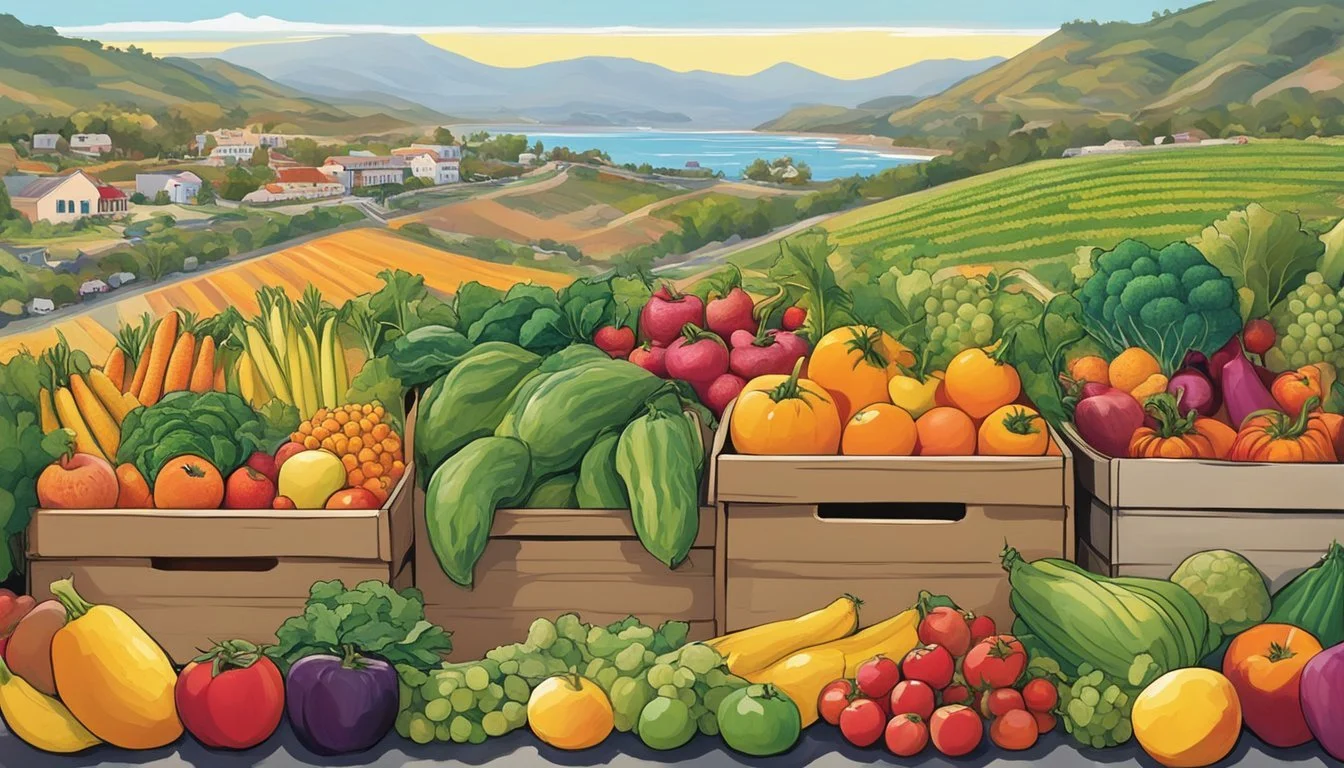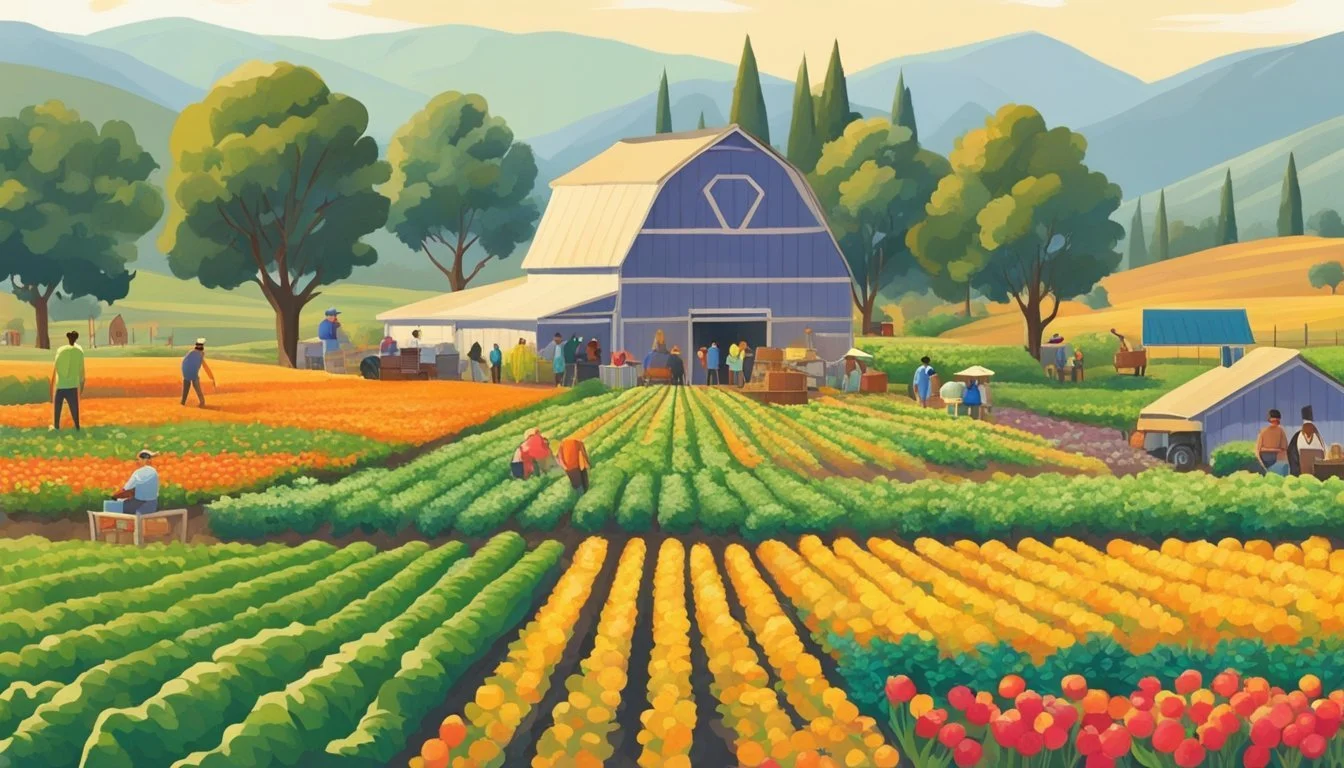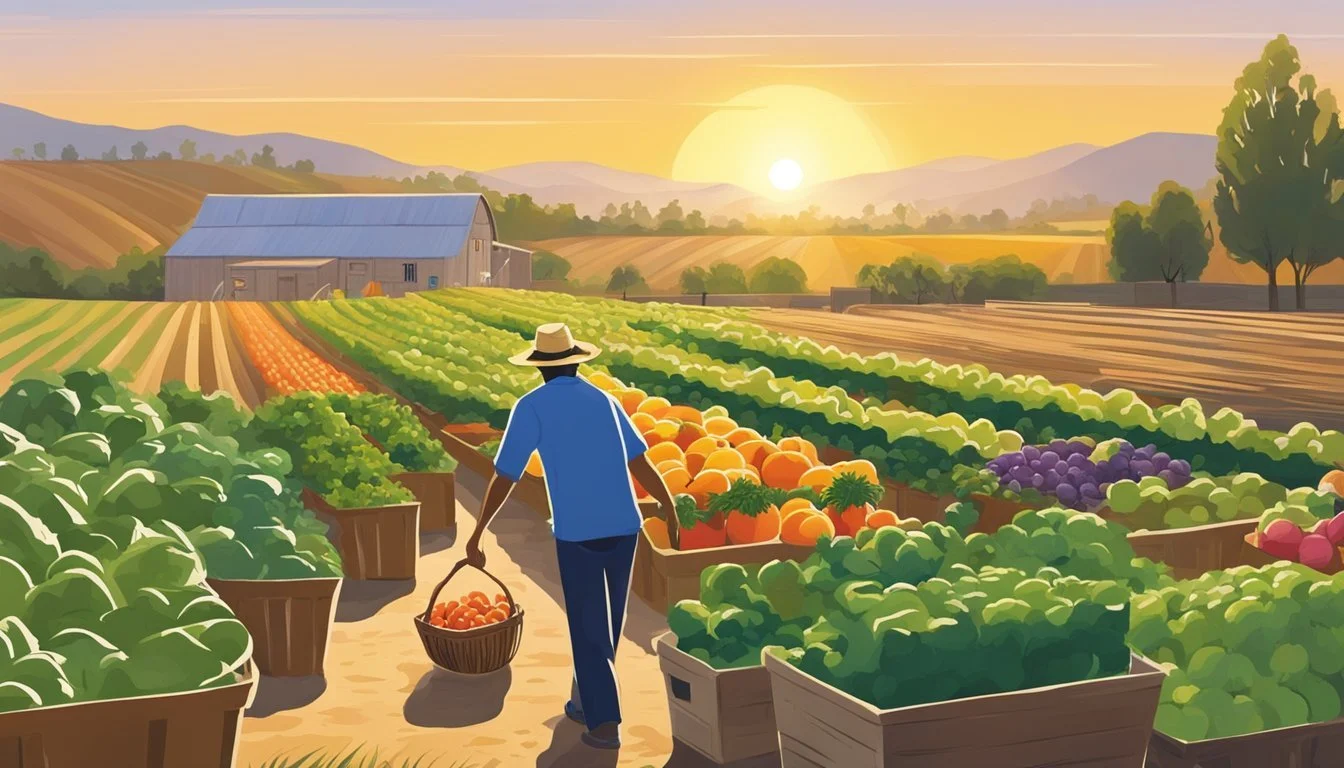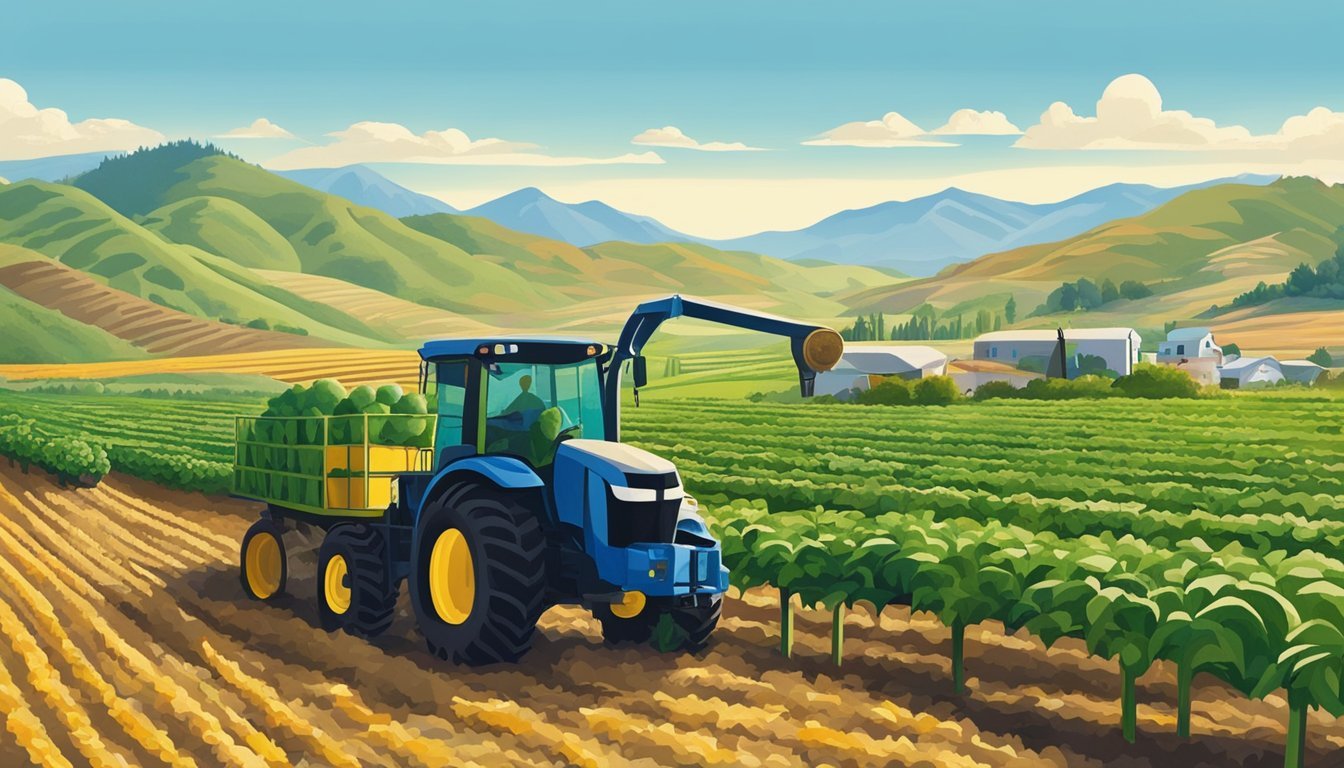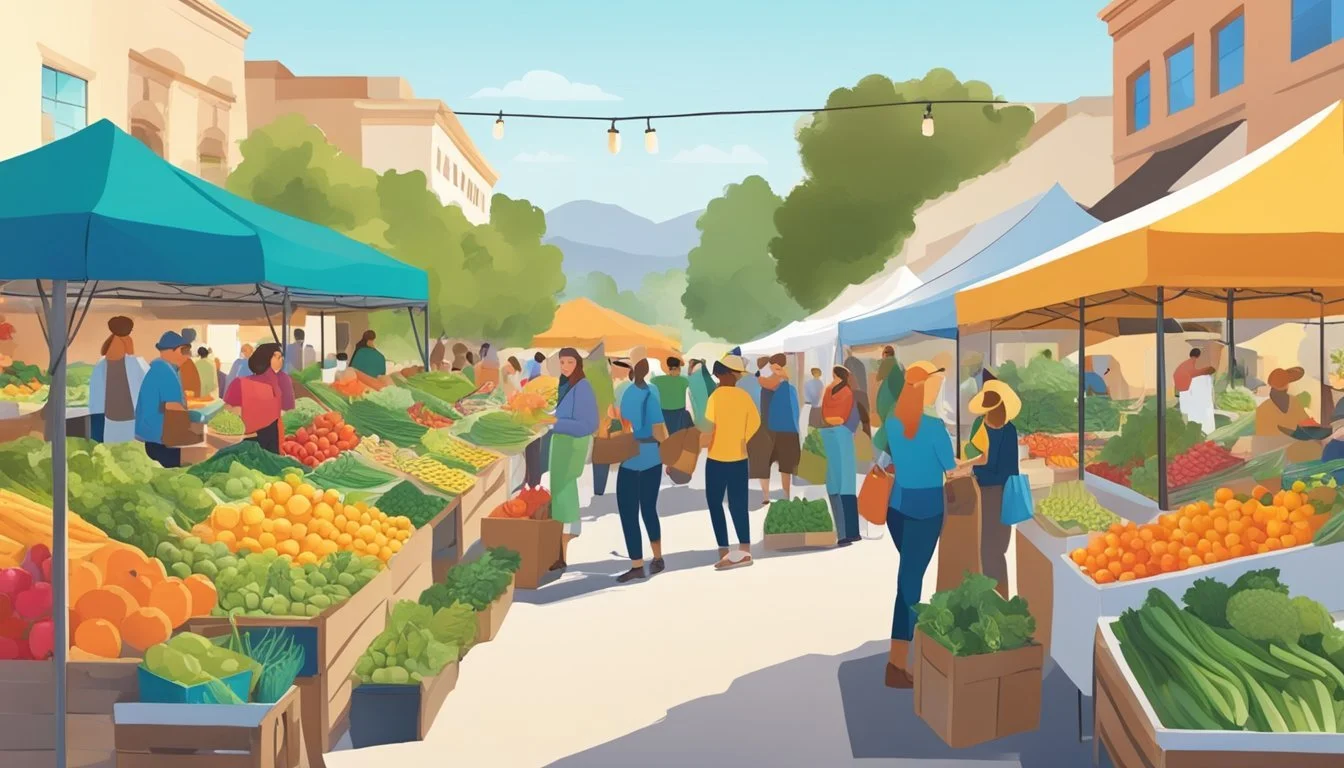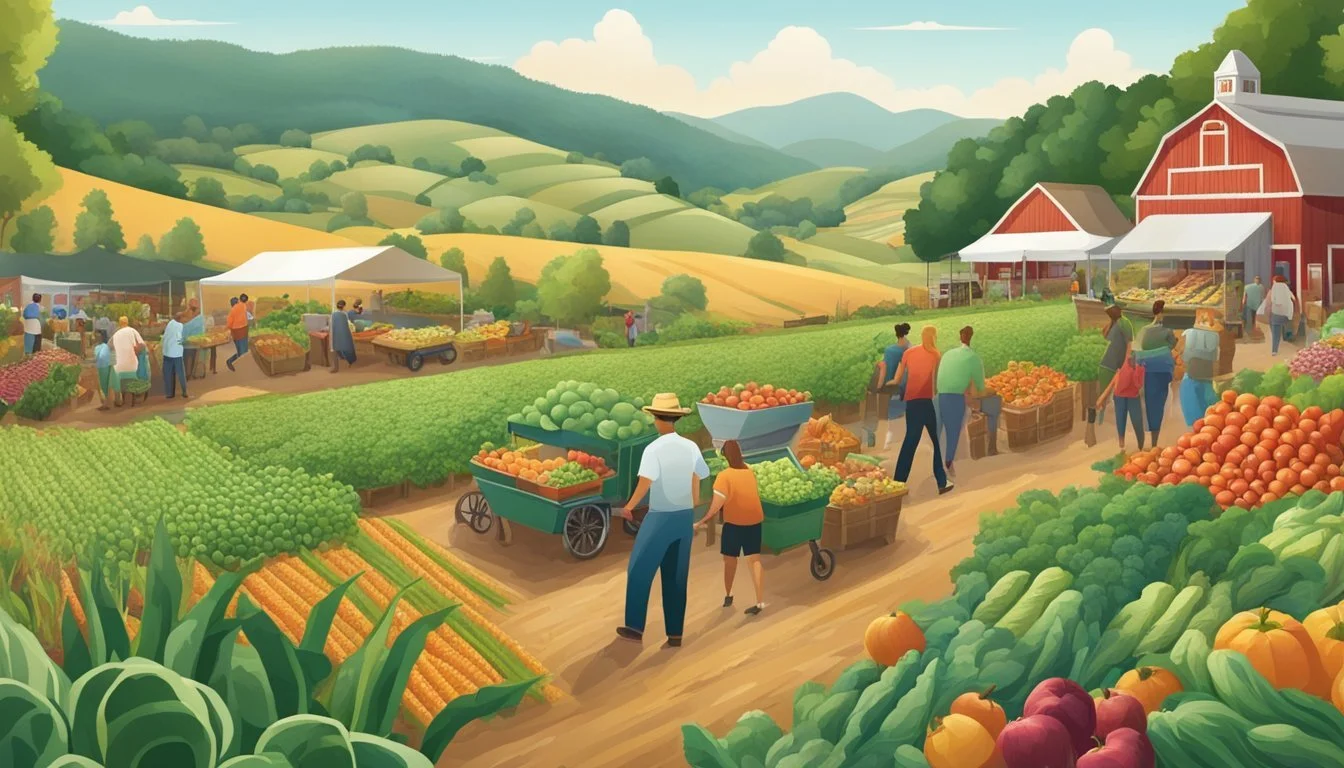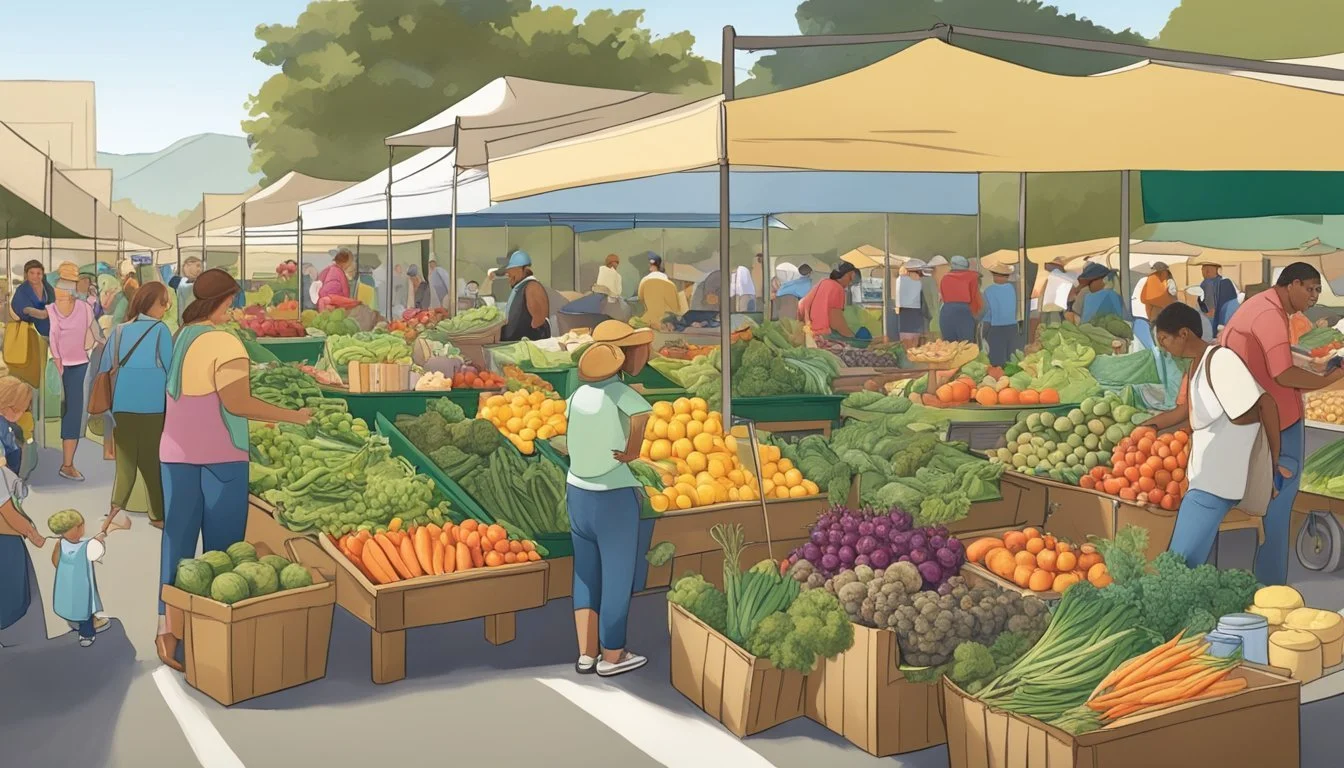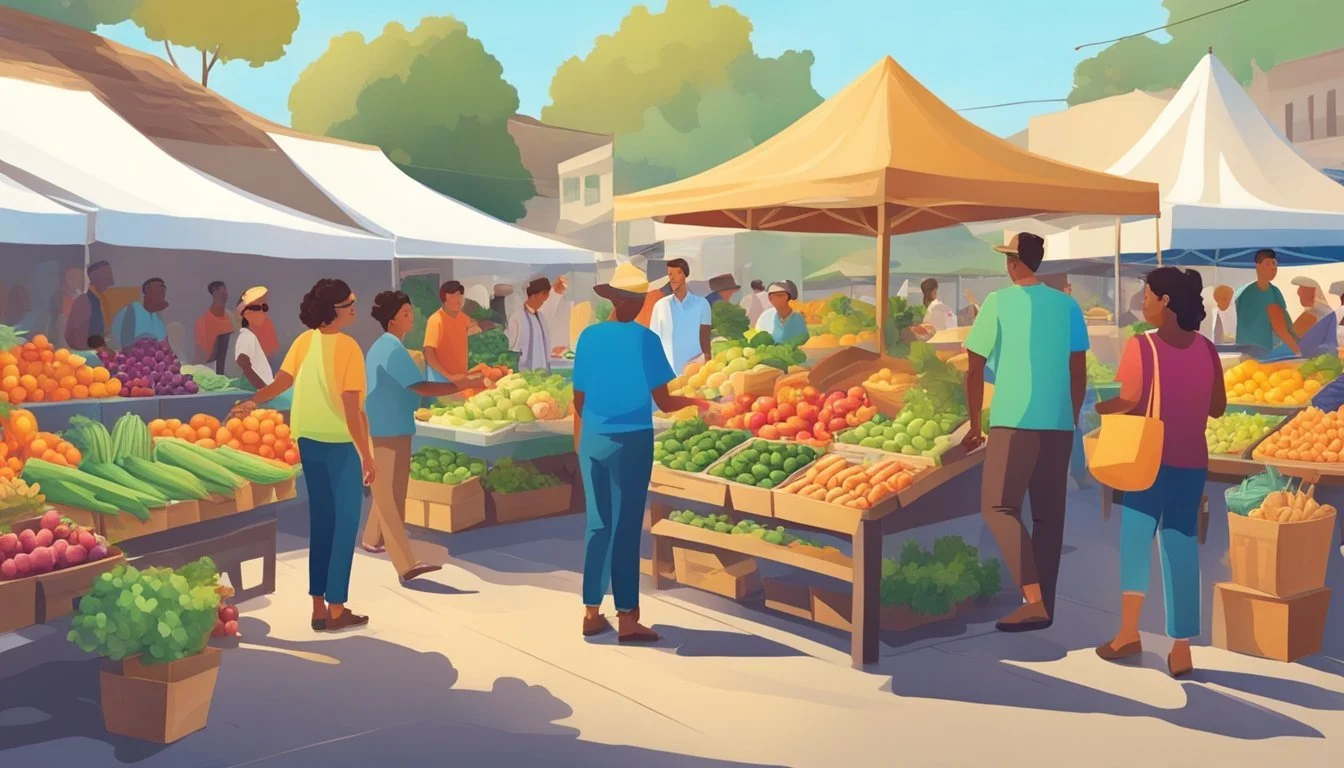Community Supported Agriculture (CSA) in Ventura, CA
A Guide to Local Farm Partnerships
Community Supported Agriculture, or CSA, represents a food distribution model that directly connects consumers with local farms. In Ventura, California, this model bridges the gap between residents and the agricultural community in the region by offering various "shares" to the public, which consist of a box of locally grown produce and occasionally other farm products. The CSA concept is not just about providing food; it's a commitment to support and invest in local agriculture, where the benefits go both ways—fresh, seasonal food for the members and a guaranteed market for the farmers.
Ventura's mild climate and productive soils make it an ideal location for a variety of crops, which in turn fuels a vibrant community of CSAs. Such agricultural initiatives have been nurtured and supported by both the farmers and the community, ensuring that the tradition of small-scale, sustainable farming persists even as urbanization continues to encroach on farming areas. By partnering with local farms through CSAs, residents of Ventura are not only enjoying fresh organic produce but are also contributing to the preservation of local farming culture and the environment.
The growth of CSAs in the area has been substantial, as many residents have come to appreciate the benefits of receiving high-quality, fresh produce directly from their local farmers. In Ventura County, a number of CSAs operate, providing weekly deliveries of seasonal goods, that reflect a commitment to agricultural stewardship and community health. Moreover, this system fosters a transparent food chain, where consumers understand where their food comes from and farmers receive fair compensation for their produce, reinforcing the CSA model as a cornerstone of Ventura's local food movement.
The Concept of Community Supported Agriculture (CSA)
Community Supported Agriculture (CSA) represents a partnership between local farmers and community members that redefines the relationship between consumers and the food they eat. At its core, CSA is a subscription-based model where members pay for a season's worth of produce upfront, sharing both the risks and bounties of agricultural production.
Membership in a CSA fosters a connection to the land and the food it yields. Members typically receive weekly or bi-weekly shares containing a variety of locally-grown farm products. This could include vegetables, fruits, herbs, and sometimes even dairy or meat, depending on the farm’s offerings.
The relationship established through a CSA is symbiotic. Farmers benefit from the financial security provided by member subscriptions, allowing them to focus on good land stewardship and sustainable farming practices. In turn, community members enjoy fresh, local produce directly from its source, which often leads to a deeper understanding of seasonal eating and supportive nutrition.
CSA Attributes Description Local Food sourced from nearby farms. Community Supports local economies and agriculture. Subscription Upfront payment for seasonal delivery. Relationship Direct farmer-consumer interactions.
In Ventura, CA, and similar communities, CSAs are an integral part of the local food movement, illustrating a commitment to environmental sustainability and the well-being of both producers and consumers. Through mutual support, CSA members and farmers uphold a thriving local ecosystem that benefits all participants.
CSA Benefits for Ventura Residents
Community Supported Agriculture in Ventura offers tangible advantages that directly impact the local economy, support sustainable agricultural practices, and enhance community health.
Enhancing Local Economy
By participating in a CSA program, residents of Ventura play a crucial role in bolstering the local economy. Money spent on CSA shares remains within the community, resulting in financial support for local farmers. CSA models typically involve various pick-up locations in Ventura, such as the Pierpont neighborhood, which further aids in catalyzing economic activity in these areas.
Direct financial infusion: Funds from CSA memberships go straight to Ventura's farmers.
Promoting local businesses: CSA encourages consumers to buy from local markets, keeping the economic benefits within the community.
Supporting Sustainable Agriculture
Sustainable agriculture is at the heart of Ventura's CSA programs. These programs support farms that are often committed to organic farming practices, ensuring that 85% of their production is organic. Sustainable farming not only conserves natural resources but also minimizes the carbon footprint associated with long-distance transportation of food.
Reducing carbon emissions: Local sourcing means less transportation, leading to fewer emissions.
Encouraging organic practices: Organic farming is supported, enhancing biodiversity and soil quality.
Improving Community Health
CSAs in Ventura contribute significantly to improving community health. Members receive a mixture of fresh, seasonal produce, fostering a diet rich in nutrients and minimizing the consumption of processed foods.
Access to fresh, seasonal produce: Regular boxes of fresh vegetables and fruits from local CSAs promote a healthier diet.
Nutritional benefits: Organic and sustainably grown produce is often of higher nutritional quality.
How CSAs Work
Community Supported Agriculture (CSA) in Ventura operates on a subscription-based model that fosters a partnership between local farmers and community members. Members purchase a "share" of the farm's production in advance of the growing season. In return, they receive regular deliveries of fresh, seasonal produce.
Purchasing Shares: A share typically refers to a weekly box of vegetables, although some CSAs also include fruits, eggs, meat, and other farm products. The offerings are based on seasonal availability and are distributed at intervals agreed upon by the CSA and its members.
Seasonal Produce: The cornerstone of CSA is the focus on seasonal produce. This means that the contents of the share boxes are determined by what is currently in season and harvested by the farmers. This encourages a varied diet based on the natural growing cycle.
Membership Duration: CSA members usually commit to a full growing season, which may vary in length. Some CSAs in Ventura organize their memberships in 12-week seasons, where options are available for full shares or half shares—the latter commonly entails receiving a box every other week.
Community Engagement: Besides the tangible benefits of receiving fresh produce, CSA membership often involves community engagement activities such as potluck parties at the farm and volunteer opportunities. This enhances the connection between the members and the farmers and fosters a sense of community spirit.
Distribution: Pickup locations are generally set in easily accessible areas, and some CSAs offer home delivery services, sometimes for an additional fee. Members are informed where and when to collect their produce, reinforcing the cyclical nature of farming and food consumption.
Selecting the Right CSA in Ventura
Ventura County offers a variety of Community Supported Agriculture (CSA) programs, each with unique features suited to different preferences. Knowing options, produce cycles, and share sizes ensures a rewarding CSA experience.
Researching Local CSA Options
Consumers interested in CSA programs in Ventura should start with thorough research. Local farms, such as Underwood Family Farms, provide organic produce and year-round memberships with additional benefits such as farm tours and event discounts. The Abundant Table offers pesticide-free produce and includes items from local farms to maximize variety. It is crucial to investigate each CSA's practices, produce origins, and member perks.
Underwood Family Farms: Organically grown produce, year-round operation.
The Abundant Table: Pesticide-free, local sourcing for seasonal items.
Understanding Seasonal Produce Cycles
CSA shareholders typically receive a regular supply of seasonal produce. In Ventura, this implies a shift in the variety of vegetables and fruits across the year. CSAs follow a seasonal calendar to ensure fresh, local produce; thus, members may expect items like citrus in winter and avocados in summer. The key is matching expectations with what is naturally available during the seasons.
Winter: Citrus fruits
Summer: Avocados, Stone fruits
Assessing Share Sizes and Variety
CSAs offer different share sizes to accommodate various household needs. For instance, Ventura's CSAs might offer full shares priced at $300 for weekly boxes or half-shares at $150 for biweekly boxes. Shareholders should consider their consumption patterns when choosing the size and frequency of CSA boxes, which typically consist of a diverse mix of vegetables and fruit.
Full share: Weekly box, suitable for families.
Half-share: Biweekly box, ideal for individuals or small households.
Farmers' Role in CSAs
Farmers are the pivotal force behind Community Supported Agriculture (CSA) programs in Ventura, CA. They dedicate themselves to sustainable agriculture, often employing organic farming practices to cultivate a variety of farm products. These products not only include an array of vegetables and fruits but also often extend to eggs, cheese, and even flowers, depending on the farm's capacity and the community's needs.
The relationship between the farmer and the community is symbiotic. By offering shares of their harvest through CSA memberships, farmers receive upfront capital to support the operational costs of the farm. This financial structure allows them to focus on quality and sustainable production without the immediate pressure of market sales.
Organic farms play a significant role in the CSA model. They prioritize environmentally friendly practices and often avoid synthetic pesticides and fertilizers, thereby contributing to healthier ecosystems. CSA members benefit by having access to fresh, locally-sourced, and often chemical-free produce.
The table below outlines key contributions and responsibilities of farmers within CSAs:
Farmer Responsibility Contribution to CSA Crop Planning Diverse produce selection tailored to community preferences Sustainable Practices Implementation of organic methods and preservation of local ecology Harvesting Regular picking and preparation of shares to ensure freshness Distribution Coordination of pickup locations or delivery systems for members Communication Regular updates to members on crop status, farm events, and potential product variations
Through direct interaction with members, farmers gain insight into the desires of their local community, fostering a responsive and adaptive farming approach. The transparency provided by this connection helps in building trust and ensures that the consumer is well-informed about how and where their food is being produced.
The Member Experience in Ventura CSAs
Community Supported Agriculture (CSA) programs in Ventura, CA, provide consumers with a way to purchase seasonal produce directly from local farms. CSA members subscribe to the harvest of a particular farm or group of farms, which cultivates a strong sense of community and shared responsibility toward supporting local agriculture.
Subscription Details
Full Share: For $300, a member receives a weekly box of produce.
Half-Share: At $150, a member gets a box every other week.
Subscriptions are typically organized in 12-week cycles, and delivery options are available for an additional fee, highlighting the convenience factor for consumers who value both accessibility and local freshness.
Member Commitment
Pre-payment for a season's worth of produce, fostering a direct connection with local farming operations.
Engages consumers in the ebb and flow of seasonal agriculture, deepening their understanding and appreciation for local food systems.
Community Connection
Members often interact with the farmers and sometimes participate in farm-related activities.
CSAs may offer farm visits, enhancing the relational aspect between the community and food producers.
Impact on Eating Habits
CSA members report shifts towards healthier eating patterns as they incorporate a diverse array of fresh produce into their diets.
An increased awareness of seasonal and sustainable eating practices is a common reflection among Ventura CSA participants.
Through such programs, members in Ventura support regional farmers, contribute to the local economy, and participate in a sustainable food network that values the source and quality of what they consume.
Economic Aspects of Community Supported Agriculture
Community Supported Agriculture (CSA) in Ventura represents a transformative economic model, seamlessly integrating consumers with the regional agricultural framework. Through a subscription-based system, members purchase shares or "farm boxes" from local farms, securing a weekly supply of fresh produce and creating a predictable income stream for farmers.
Revenue Model
CSA farmers collect income before the growing season.
Predictable revenue allows for effective financial planning.
Reduces reliance on traditional loans.
Local Economic Impact
Money stays within the community, bolstering the local economy.
CSAs often employ area residents, creating jobs and supporting the local workforce.
Consumer Impact
CSA models typically offer fresh produce at competitive prices.
Accessible price points contribute to a diversified customer base.
Payment Options Description Electronic Benefits Transfer (EBT) CSA programs in Ventura might accept EBT, facilitating Supplemental Nutrition Assistance Program (SNAP) transactions. APIs for Subscription Management Utilize technology to streamline payments and manage memberships, making CSA shares user-friendly and easily manageable.
Community Benefits
Members support sustainable agriculture practices.
CSA strengthens ties between residents and local farmers.
The CSA model's economic relevance extends beyond mere transactions, fostering a resilient food system that benefits both the local economy and the stakeholders it serves. Through this approach, Ventura's CSA ventures contribute meaningfully to regional economic health, offering a blueprint for a sustainable, community-centric food economy.
Challenges of Running a CSA
Running a Community Supported Agriculture (CSA) in Ventura, CA presents unique challenges that are integral to the nature of this agricultural model. CSA managers must contend with environmental unpredictability and carefully balance supply with community demand to ensure the sustainability of the local food system.
Dealing With Weather Variability
Ventura's climate, while generally mild, can be unpredictable. CSAs face the difficulty of weather variability which directly impacts crop yield. For example:
Drought: Extended periods without rain can stress water resources, crucial for irrigation.
Unseasonal Rains: Sudden rain can damage crops, especially those at harvest stage.
Strategies to mitigate these risks include:
Employing drip irrigation to conserve water.
Creating rain shelters for sensitive crops to protect against unseasonal rains.
The community's understanding and support are crucial when weather extremes affect the harvest, as this directly impacts the share distributed among CSA families.
Managing Supply and Demand
Ensuring a balance between the supply of produce and the demand from consumers is a significant challenge for CSAs. Key factors involve:
Estimating consumer interest to match production without creating excess or shortage.
Adapting the crop variety to cater to local food preferences.
To manage supply and demand, CSAs may:
Use crop rotation to maintain soil health and biodiversity.
Provide a flexible share system so members can personalize their portions.
Encourage feedback from the community to align production with preferences.
CSAs depend on the support of local families and individuals, making consumer relationships and effective communication vital components in the system's success.
Community Engagement and Educational Opportunities
Ventura County's Community Supported Agriculture (CSA) programs serve as robust platforms for community engagement and educational outreach. Participants in these programs come together in support of local agriculture, forging connections between consumers and the farms that feed them. Education is a cornerstone of these initiatives, as they provide invaluable opportunities for members to learn about sustainable farming practices and the importance of supporting local food systems.
CSA Innovation Network plays a pivotal role in the development of community-supported agriculture. By fostering a network of farmers, community members, and organizations, the network encourages shared learning and innovation within the realm of local agriculture.
Educational events are a signature feature of Ventura's CSA programs. Spearheaded by entities like UC Cooperative Extension, these events present an array of learning experiences:
Workshops and Seminars: Aimed at both adults and children, these sessions cover various topics such as organic farming, seasonal produce selection, and cooking demonstrations.
Farm Tours: CSA members have opportunities to visit local farms, witnessing firsthand the farming process and understanding the effort that goes into producing their food.
Volunteer opportunities further strengthen community building efforts, allowing individuals to contribute directly to the success of their local CSA. These hands-on experiences not only help sustain the CSA but also instill a deeper appreciation for the hard work involved in food production.
Additionally, the Ventura County Fair has evolved into an important agricultural event where the public can engage with local farmers, enhancing awareness of Ventura's rich agricultural presence and reinforcing the bond between producers and consumers.
Practical Tips for Ventura CSA Members
When individuals in Ventura choose CSA memberships, they prioritize fresh, local produce. Here are some practical tips for those participating in CSA programs:
Full vs. Half-Share: Consider how much produce your household can consume. A full share is typically ideal for a family or those who cook often, whereas a half-share suffices for smaller households.
Home Delivery: Some farmers offer home delivery for an extra fee, which can be convenient for members with busy schedules.
Making the Most of Your Produce:
Ask Questions: Don't hesitate to contact your CSA farmer with any inquiries about the produce, such as the best storage practices or the background of unfamiliar items.
Recipes: Utilize the recipes provided by the CSA. They're tailored to the box's contents and can introduce new, enjoyable ways to prepare your vegetables.
CSA Component Recommendations Farmers Markets Use the opportunity to supplement your CSA box with additional items as needed or desired. Weekly Pickups Be punctual, pickups are often within a set time window, and this helps maintain the quality of the produce.
Community Involvement:
Attend farm events and tours if offered. This can enrich the CSA experience by forging a stronger connection with the source of your food and the community around you.
By keeping these suggestions in mind, members can deeply appreciate the value of their investment into Ventura's local agriculture and savor the plethora of seasonal goods provided by their chosen CSA.
CSA Impact on Environmental Sustainability
Community Supported Agriculture (CSA) in Ventura, California, has been instrumental in promoting environmental sustainability within the region. Through sustainable agriculture practices, CSAs maintain a harmonious relationship with the ecosystem. They utilize farming methods that conserve water, build soil health, and minimize pollution. Through these efforts, CSAs contribute to preserving Ventura's natural resources for future generations.
Organic farming is a cornerstone of many CSAs in Ventura, marked by the non-use of synthetic pesticides and fertilizers. These practices reduce the chemical load on the environment, enhance soil fertility, and foster biodiversity. Fields managed organically become a haven for wildlife, beneficial insects, and native plants:
Biodiversity Support: By encouraging a variety of crops, CSAs support pollinators and other vital species.
Soil Health: Organic practices such as composting and crop rotations improve soil structure and health.
The carbon footprint of food systems is an area where CSAs have a significant impact. Localized food production and distribution reduce greenhouse gas emissions associated with long-distance transportation. CSAs in Ventura often encourage members to pick up their produce directly from the farms or offer community drop-off points, further lowering carbon outputs.
Shorter Supply Chains: Direct distribution from farm to consumer curtails transportation emissions.
Seasonal Eating: CSA members eat seasonally, which means less energy is spent on growing foods out of season or shipping them from afar.
It's clear that CSAs in Ventura are more than just a food sourcing method—they are a commitment to environmental stewardship and a tangible demonstration of how agriculture can operate in harmony with the planet.
Additional Resources for CSA in Ventura
Ventura County offers a range of resources for those interested in learning about or joining a Community Supported Agriculture (CSA) program. The CSA Innovation Network serves as a hub for sharing ideas and tools specific to CSA development. This online platform can be invaluable for both consumers and organizations.
For a more local touch, Edible Ojai & Ventura County provides updates on CSA boxes and related options. It lists contact information and pickup details for various farms such as Earthtrine Farms, where orders are available for pickup at specified times.
A comprehensive guide can also be found which lists CSA details such as pickup locations, delivery options, and pricing structures for assorted programs within Ventura. This guide simplifies the decision-making process for potential CSA members by organizing information neatly into accessible formats.
The FairShare CSA Coalition offers information about the concept of CSA, its benefits, and how community members can engage with local farms by purchasing shares. This might also include a list of farms providing CSA services, their produce offerings, and how to subscribe.
Lastly, the Community Alliance with Family Farmers embellishes the philosophy behind CSAs, emphasizing the health, community, and ecological benefits. Their resources can provide a solid foundation for understanding the full spectrum of CSA impacts.
Overall, for those residing in Ventura looking to integrate locally sourced food into their lives, there are print and web resources available that offer robust and clear guidance on local CSA options.

